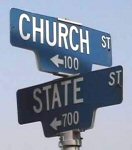Independent Religionist's Liberty
Are U.S. Constitutional religious rights refused non-aligned religionists?

![]() High Times, June 1996 issue, Peter Gorman reports that the 9th Circuit Court of Appeals in San Francisco has "unanimously ruled that Rastafarians have the right to use a freedom-of-religion defense in marijuana-possession cases. The ruling, based on the 1993 Religious Freedom Restoration Act...is the first of its kind with regard to marijuana use." Details of the case are given, not relevant here, and then the article notes, "The ruling does not suggest that Rastafarians have a right to smoke or possess marijuana, only that they have a right to raise their use of the herb, which they consider a sacrament, as a defense against possession charges."
High Times, June 1996 issue, Peter Gorman reports that the 9th Circuit Court of Appeals in San Francisco has "unanimously ruled that Rastafarians have the right to use a freedom-of-religion defense in marijuana-possession cases. The ruling, based on the 1993 Religious Freedom Restoration Act...is the first of its kind with regard to marijuana use." Details of the case are given, not relevant here, and then the article notes, "The ruling does not suggest that Rastafarians have a right to smoke or possess marijuana, only that they have a right to raise their use of the herb, which they consider a sacrament, as a defense against possession charges."
In case you're not familiar with the act, the article notes that "the Religious Freedom Restoration Act [guarantees] protection of religious practices unless there is a 'compelling government interest' at stake and if prohibiting them is the 'least restrictive means' of achieving that compelling interest."
Now here is the crux of the matter, my reason for posting this, again from the article: "the court went to great pains to note that Rastafarianism is a recognized religion with a long history of marijuana use and that 'It is not enough in order to enjoy the protections of the Religious Freedom Restoration Act to claim the name of a religion as a protective cloak."
Now, this stands in line with past decisions on religious freedoms, as I understand them (I am not a lawyer). Federal schools require children to have had certain vaccinations, unless those children are members of a "recognized religion" which has objections to such programs, e.g. the Jehovah's Witnesses. It is not enough to have an ethical, moral, or personal material (scientific) belief in the inefficacy or dangers of vaccinations, you must be a member of a "recognized religion" which has a standing religious objection to vaccinations. Similar rulings, so I understand, regard military conscription (recalling the furor and accusations when Muhammad Ali invoked his Islam beliefs to refuse to take up arms against his fellow human being).
But what about the individual believer? Like many devout members of "organized" and "recognized" religions, one might have a religious belief against military service, against vaccination, or for marijuana or peyote, but as a "non-aligned" individual of faith, THE GOVERNMENT DOES NOT RECOGNIZE THAT RELIGION. In effect, individual religionists are penalized for their beliefs, their religious liberty denied. The government considers such individual believers to be "claiming the name of a religion as a protective cloak."
Such is my understanding. As an independent religionist, a cult of one (or at most a cult of my immediate family), with strong beliefs in the involvement of the Spirit at all levels of physical and mental activities, this is outrageous to me. If a Jehovah's Witness can claim religious objection to protect children against invasive government-ordained medical procedures, why cannot any religious individual who holds that the body is the temple of the spirit? If a Quaker can be exempted from military conscription, why cannot any religious individual who holds that individual conscientious choice dictates against forced military service? If a Rastafarian or a Peyote-using AmerInd is permitted to partake of their sacraments (and this is not, to my understanding, yet decided, due to the anti-"drug" hysteria which addles society's morality), then why cannot any individual believer rightfully partake of the bounty of God's spiritually-uplifting medicines?
In none of these cases, you will note, does an individual transgress against another. Thus, all such private individual behaviors or substance use abide by the Golden Rule of love of God and fellowship with one another upon which are supposed to hang all the laws, as Jesus taught. This is Principle, and religiously-held. But if you're not a Member of a State-recognized (and therefore State-sanctioned) organized religion, you're not "religious." The law, therefore, defines and establishes "religion," in violation of the First Amendment proscription on doing so. Even if religious defense were permitted, the burden of proof would not be upon the State to show that religion is only being invoked as a protective cloak, but upon the individual to prove that these are truly religious beliefs; without an "organized" religion with a "history" of beliefs in these regards, any such defense is likely to fail.
Until the individual religionist can rightfully claim to BE a religionist, and rightly point to such "unpopular" beliefs and find protection therefore, the Religious Freedom Restoration Act, not to mention the First Amendment, are being violated.
Prohibition fuels gangsterism —It's not drugs but PROHIBITION which provides the fuel for the modern equivalent of rum-runner profits and Al Capones.
Repeal! / Repeal Heals — not only is the so-called war on drugs utterly unwinnable, it is in its very conception a perversion of the important purposes of good government. The way to personal or social health is positive.
The Golden Rule and Prohibition — Countering common erroneous arguments for prohibitionism and applying the Golden Rule
A run-in with Officer Green — "WHAT'S THAT SMELL??" scowled Officer Green, and ordered me out of my car.
Head Shop — Cartoons, songs, and more regarding the appeal of indulgences and the consequences of desire.
